- The Church in the Changes of the Time 1969–1999
- The Protestants about Jan Sarkander — Magazine to the New Catholic Saint's Canonization
- The PROTESTANTS in the Early Toleration Time in Bohemia and Moravia
- Jan Fiala: The Horrible Times of the Counter-Reformation
- Jan Fiala: The Dark, Koniáš's Epoch
- Eva Melmuková: The Patent Called the Toleration
- Eva Melmuková-Šašecí — Wilhelm Stritar: The Evangelic Southern Bohemia and Southern Moravia
- Amedeo Molnár: On the Edge of the Ages
- Jiří Otter: Around Prague Tracking Czech Reformation
- To Understand to the History (The Development of Czech-German Relations in Czech Territory in 1848–1948)
- Čestmír Rychetský: Tourist Guidebook Around the Chrudim Seniorat
- Kristoslav Řičař: Civic Genealogy — the Fundaments of the Genealogy Research
- Vladimír Sakař: Jan Žižka, Our Faithful Brother
- Vladimír Sakař and Co.: Tracking the Hussites in Moravia and Silesia
- Edita Štěříková: The Process of the Life of Czech Exiles in Berlin in 18th Century
- Edita Štěříková: Exiles' Asylum in Lusatia and Saxony
- Edita Štěříková: Exile Preacher
- Edita Štěříková: Invited to Silesia
- Edita Štěříková: Shortly about Exiles of the post-White-Mountain Period
- Edita Štěříková: Zelów (Czech Exile Community in Poland) reprint — again obtainable
- Edita Štěříková: The Fatherland
- Edita Štěříková: From the Need of the Redemption (Czech Exile in 18th Century to Prussian Silesia)
- The Rupture in the Curtain (or the Church Contacts of Dutch and Czech Protestants in 1959–1989)
Čestmír Rychetský: Tourist Guidebook Around the Chrudim Seniorat
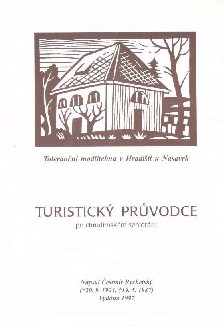
Publication:
- a tourist guidebook dealing with the 25 congregations of the Chrudim Seniorat of the Evangelic Church of Czech Brethren (“a seniorat” is a word for the superior territorial and administrative complex of this Church); compiled already in 1974, issued after the author's death;
- there is a brief history of every congregation, accessibility, suggestions of trips on foot or by car to the surroundings of the congregation, congregations in neighbourhood, by greater towns also non-church monuments, by smaller congregations also the localization of the place;
- additionally a tabular map and couple of black-white photographs
About the Author:
Čestmír Rychetský (* 1921, † 1987), evangelic parson (Evangelic Church of Czech Brethren), worked in parishes: Jindřichův Hradec, Velká Lhota near Dačice, Telč, Chomutov and Hradiště; research worker at the branch of Science of the Archives (archives of congregations); published special monograph: The Preachers and Congregations of the Czech nationality of the Churches A. C. a H. C. in Bohemia and Moravia 1781–1918 (1983)
Bibliographic data:
Rychetský, Čestmír: Turistický průvodce po chrudimském seniorátu, Pardubice 1997, 20 p.
Notes:
- available only in Czech
- to order on the address of the Society VERITAS
- price 25 CZK
Kristoslav Řičař: Civic Genealogy — the Fundaments of the Genealogy Research
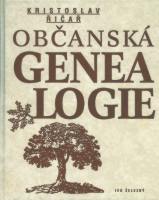
Publication:
- a handbook of a genealogist-amateur, full of worth pieces of advice for making a genealogical tree;
-
“The book by K. Řičař is based on large experience and is written for amateurs in the genealogical research. It contains everything that we now call ‘know how’. … Unlike the hopelessly sold out the Introduction to Genealogy, the new Kristoslav Řičař's book is more comprehensive. Its main new asset is the challenge (and also instruction): the genealogist's work should not finish with making a table of names of the ancestors. K. Řičař leads his readers to the wider conception of work: to making and recognition of the ‘image of the history of the ancestry’ — i.e. to recognition the events and circumstances that influenced the life of everyone of our ancestors. This genealogical work — examining the ‘little history’ of our ancestors who were also the elements of the ‘great history’ can really be a worthy thing for our receiving the past.”
(according to the Introduction written by PhDr. Jindřich Schwippel);
- graphic appendixes contain prints of the historical sources with ‘translation’ of texts, suggestions of the design of the genealogist's accounting cards, forms for excerpting of data from registries and examples of the graphic design of the genealogical trees
About the Author:
dipl. tech. Kristoslav Řičař (* 1920, † 2004), famous Czech genealogist and person who long-time popularizes genealogy in public; one of the promoters of the Society VERITAS, its Secretary and honorary member of the Administrative Board for a long time; publication: The Introduction to Genealogy — Who Are My Ancestors? (1995)
Bibliographic data:
Řičař, Kristoslav: Občanská genealogie — Základy rodopisné práce, Ivo Železný Publisher, Prague 2001, 136 p., graphic appendix 33 p.
ISBN 80-240-1080-1
Note:
— available only in Czech
Vladimír Sakař: Jan Žižka, Our Faithful Brother
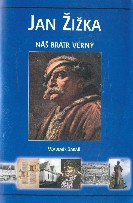
Publication:
- a brief and compendious discourse on the life and role of Jan Žižka of Trocnov, it is based on results of work of other historians because this problem is in so far and in a comprehensive way processed that you can add really only few of prime discoveries;
- it is published, when the Hussitism — and Jan Žižka especially — is often used to be demonized, while the main stress is put on the hypercriticism in evaluation of the advanced armies and Žižka's personality. Often we forget the reality of living in the Hussite period, when most of inhabitants of Bohemia and Moravia were in jeopardy in consequence with the crusades that were dispatched into this land regularly. If we refused the defence generally, we would have to also reject the defence of the land and its population in the recent history (Nazi's occupation, communistic totality).;
- added 10 text appendixes (reproductions of sources) and a list of used literature
About the Author:
PhDr. Vladimír Sakař, CSc. (* 1930, † 2004), archaeologist and historian, was for a long time employed by the Archaeological Institute of the Czechoslovak Academy of Science and in the Department of the Prehistory and Protohistory of the National Museum in Prague; special interest — research of the Roman imports to the border areas of the Roman Empire, former external teacher of the Department of Classical Archaeology at Charles University in Prague; Church historian of the Czechoslovak Hussite Church, leader of the Literary-Historical Branch of the CHC Diocese Board in Prague, member of the historical commission of the Ideological Board of CHC; redactor of the bulletin “The New Fight”, worker in the ecumenical boards — the Circle of the Czech Spiritual Traditions, Ecumenical Commission for the Study of the Recatholization of Czech Lands and moderator of the Historical Society for Updating the Legacy of Czech Reformation VERITAS; publications: Huss' Legacy at the Statesmanship of George of Poděbrady (1995), Tracking the Hussites in Moravia and Silesia (2001, leader of the team)
Bibliographic data:
Sakař, Vladimír: Jan Žižka, Our Faithful Brother, Czechoslovak Hussite Church, Prague 2002, 55 p.
ISBN 80-7000-293-3
Note:
— available only in Czech
Vladimír Sakař and Co.: Tracking the Hussites in Moravia and Silesia
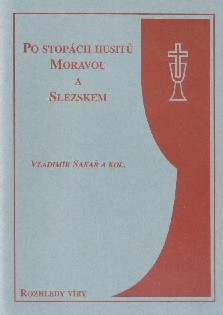
Publication:
- a study focused on the historical topography of the Hussite epoch in Moravia and in the part of the historical province of Silesia which is currently a part of the Czech Republic;
- every described place begins with a brief history, characterization of the local activities of Hussites, data about the Hussite and utraquistic administration, review of the importance of the place and also the fact, if the monument there exists up to this day;
- additionally a map of orientation, used special literature and an alphabetic index all 106 described places
About the Author:
PhDr. Vladimír Sakař, CSc. (* 1930, † 2004), archaeologist and historian, was for a long time employed by the Archaeological Institute of the Czechoslovak Academy of Science and in the Department of the Prehistory and Protohistory of the National Museum in Prague; special interest — research of the Roman imports to the border areas of the Roman Empire, former external teacher of the Department of Classical Archaeology at Charles University in Prague; Church historian of the Czechoslovak Hussite Church, leader of the Literary-Historical Branch of the CHC Diocese Board in Prague, member of the historical commission of the Ideological Board of CHC; redactor of the bulletin “The New Fight”, worker in the ecumenical boards — the Circle of the Czech Spiritual Traditions, Ecumenical Commission for the Study of the Recatholization of Czech Lands and moderator of the Historical Society for Updating the Legacy of Czech Reformation VERITAS; publications: Huss' Legacy at the Statesmanship of George of Poděbrady (1995), Jan Žižka, Our Faithful Brother (2002)
Bibliographic data:
Sakař, Vladimír (et al.): Po stopách husitů Moravou a Slezskem, Czechoslovak Hussite Church in the edition Prospects of Belief, volume 15, Prague 2001, 48 p.
ISBN 80-7000-552-1
Note:
— available only in Czech
Edita Štěříková: The Process of the Life of Czech Exiles in Berlin in 18th Century

Publication:
- a thorough book focused on the last wave of the Protestant exiles from Czech Lands. It contains also the autobiographies of exiles, lists of the exile families, maps, documentary photographs;
- the next monograph Invited to Silesia (by E. Štěříková as well) is the continuation of this book, the author addicts herself to the study and mapping of Czech religious emigration for long years.
About the Author:
prom. hist. Edita Štěříková (* 1937), archivist emeritus of the Protestant Church in Hesse and Nassau, scientific worker who addicts herself long-time to the problems of Czech evangelic exile; published special literature: From the Need of the Redemption (1992), The Fatherland (1st edition; 1995), Invited to Silesia (2001), Zelów (Czech Exile Community in Poland) (2002), Exiles' Asylum in Lusatia and Saxony (2004), The Fatherland (2nd edition; 2005), Shortly about Exiles of the post-White-Mountain Period (2005), Exile Preacher (2007)
Bibliophic data:
Štěříková, Edita: Běh života českých emigrantů v Berlíně v 18. století, published by KALICH, Prague 1999, 748 p.
ISBN 80-7017-253-3
Notes:
- available only in Czech
- to order on-line in Kalich Publishers:
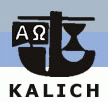 Nakladatelství a knihkupectví Kalich
Nakladatelství a knihkupectví Kalich
Jungmannova 9, 101 78 Praha 1
☎ +420 224 947 505, fax +420 224 947 504
Edita Štěříková: Exiles' Asylum in Lusatia and Saxony
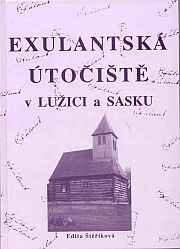
Publication:
The author of this book systematically addicts herself to the history of Czech religious exile. After three titles published in KALICH since 1999 (The Process of the Life of Czech Exiles in Berlin in 18th century; Invited to Silesia; Zelów — Czech Exile Community in Poland) she gives in her new book a whole compendium about the religious exile from the Czech Lands in 17th and 18th century across the northern and north-western border, to Lusatia and Saxony. Refugees seeking an asylum inspirited the towns that had been depopulated during war and plague. In the country they founded tens of new villages. In the alphabetical list of towns and villages there is described their short exile history according to the historical sources. In the second part there is written a brief history of some larger colonies of refugees and Czech congregations, e.g. well-known Dresden, Zittau and many more. Maps and photos appended.
About the Author:
prom. hist. Edita Štěříková (* 1937), archivist emeritus of the Protestant Church in Hesse and Nassau, scientific worker who addicts herself long-time to the problems of Czech evangelic exile; published special literature: From the Need of the Redemption (1992), The Fatherland (1st edition; 1995), The Process of the Life of Czech Exiles in Berlin in 18th century (1999), Invited to Silesia (2001), Zelów (Czech Exile Community in Poland) (2002), The Fatherland (2nd edition; 2005), Shortly about Exiles of the post-White-Mountain Period (2005), Exile Preacher (2007)
Bibliographic data:
Štěříková, Edita: Exulantská útočiště v Lužici a v Sasku, published by KALICH, Prague 2004, 550 p.
ISBN 80-7017-008-5
Notes:
- available only in Czech
- to order on-line in Kalich Publishers:
 Nakladatelství a knihkupectví Kalich
Nakladatelství a knihkupectví Kalich
Jungmannova 9, 101 78 Praha 1
☎ +420 224 947 505, fax +420 224 947 504
Edita Štěříková: Exile Preacher
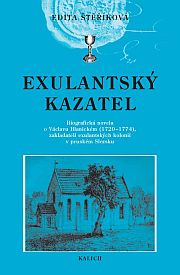
new
Publication:
- Biographic nouvelle about Venceslas Blanický (1720–1774), the founder of the exiles' colonies in Prussian Silesia.
- Edita Štěříková is one of the essential authors of the Kalich Publisher. Readers know her as the tireless writer of large historical studies where she continually recounts the history of Czech religious exile.
- Her new book will probably surprise. This time it is not a special theoretical study but the historic prose — a nouvelle. Its main hero is the historic character, exiles' preacher Venceslas Blanický.
- The prosaic diction reveals not only his personal life, but even the thrilled destiny of the exiles at all. This diction can do it more immediate and effective than the commented facts in the historical study. Author's cultured and well-advised talking is really magnificent. It puts us over to the historical times using slightly archaistic expressions. We can hear there the echo of the language of our ancestors that well-knew the Bible.
- Historical nouvelle by Edita Štěříková fulfills three sophisticated demands: it is sustained with the knowledge of things; it is literary perfect and has the ability to mediate the personal experience to the reader.
About the Author:
prom. hist. Edita Štěříková (* 1937), archivist emeritus of the Protestant Church in Hesse and Nassau, scientific worker who addicts herself long-time to the problems of Czech evangelic exile; published special literature: From the Need of the Redemption (1992), The Fatherland (1st edition; 1995), The Process of the Life of Czech Exiles in Berlin in 18th century (1999), Invited to Silesia (2001), Zelów (Czech Exile Community in Poland) (2002), The Fatherland (2nd edition; 2005), Shortly about Exiles of the post-White-Mountain Period (2005)
Bibliographic data:
Štěříková, Edita: Exulantský kazatel, published by KALICH, Prague 2007, 440 p.
ISBN 978-80-7017-063
Notes:
- available only in Czech
- to order on-line in Kalich Publisher:
 Nakladatelství a knihkupectví Kalich
Nakladatelství a knihkupectví Kalich
Jungmannova 9, 101 78 Praha 1
☎ +420 224 947 505, fax +420 224 947 504
Edita Štěříková: Invited to Silesia
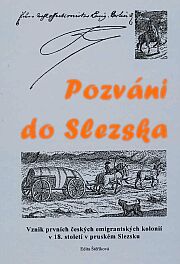
Publication:
- a large earnest book focused on Czech religious emigration after 1741 to Prussian Silesia and the establishing of the first four exile colonies in this locality;
- besides writing of history of this exile-wave it brings also the detailed lists of the exile's families, copies of the historical documents, chronological tables, maps;
- it follows to the book The Process of the Life of Czech Exiles in Berlin in 18th century by the same author, she addicts herself to the study and mapping of Czech religious emigration for long years.
About the Author:
prom. hist. Edita Štěříková (* 1937), archivist emeritus of the Protestant Church in Hesse and Nassau, scientific worker who addicts herself long-time to the problems of Czech evangelic exile; published special literature: From the Need of the Redemption (1992), The Fatherland (1st edition; 1995), The Process of the Life of Czech Exiles in Berlin in 18th century (1999), Zelów (Czech Exile Community in Poland) (2002), Exiles' Asylum in Lusatia and Saxony (2004), The Fatherland (2nd edition; 2005), Shortly about Exiles of the post-White-Mountain Period (2005), Exile Preacher (2007)
Bibliophic data:
Štěříková, Edita: Pozváni do Slezska, published by KALICH, Prague 2001, 602 p.
ISBN 80-7017-553-2
Notes:
- available only in Czech
- to order on-line in Kalich Publishers:
 Nakladatelství a knihkupectví Kalich
Nakladatelství a knihkupectví Kalich
Jungmannova 9, 101 78 Praha 1
☎ +420 224 947 505, fax +420 224 947 504
Edita Štěříková: Shortly about Exiles of the post-White-Mountain Period
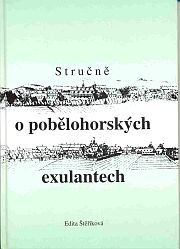
Publication:
- The hard religious persecution ruling in Czech Lands in the post-White-Mountain period till the Patent of Toleration forced hundred thousands of people to exile. Czech exiles mostly escaped to the neighbouring lands — Lusatia, Saxony, Poland, Silesia, Hungary, later also in more distant Brandenburg. The history of Czech religious exile is very difficult problem.
- The book renders a solid survey of it in a popular way.
About the Author:
prom. hist. Edita Štěříková (* 1937), archivist emeritus of the Protestant Church in Hesse and Nassau, scientific worker who addicts herself long-time to the problems of Czech evangelic exile; published special literature: From the Need of the Redemption (1992), The Fatherland (1st edition; 1995), The Process of the Life of Czech Exiles in Berlin in 18th century (1999), Invited to Silesia (2001), Zelów (Czech Exile Community in Poland) (2002), Exiles' Asylum in Lusatia and Saxony (2004), The Fatherland (2nd edition; 2005), Exile Preacher (2007)
Bibliographic data:
Štěříková, Edita: Stručně o pobělohorských emigrantech, published by KALICH, Prague 2005, 145 p.
ISBN 80-7017-022-0
Notes:
- available only in Czech
- to order on-line in Kalich Publishers:
 Nakladatelství a knihkupectví Kalich
Nakladatelství a knihkupectví Kalich
Jungmannova 9, 101 78 Praha 1
☎ +420 224 947 505, fax +420 224 947 504
Edita Štěříková: Zelów (Czech Exile Community in Poland)
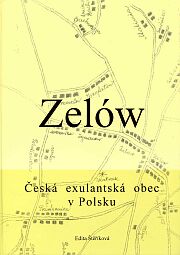
reprint — again obtainable
Publication:
- a thorough monograph focused on the history of Czech religious emigration;
- the prestigious historian writes about the history of Zelów from Czech exile view, as especially the Evangelic Reformed Church parsonage's archive in Zelów, collections of the natives of Zelów and former published literature enable.;
- In the book there are also lists of families that came to Zelów before 1820, lists of Zelów's parsons, preachers, presbyters and teachers, and lists of Czech families living in Zelów in 1945 as well.
About the Author:
prom. hist. Edita Štěříková (* 1937), archivist emeritus of the Protestant Church in Hesse and Nassau, scientific worker who addicts herself long-time to the problems of Czech evangelic exile; published special literature: From the Need of the Redemption (1992), The Fatherland (1st edition; 1995), The Process of the Life of Czech Exiles in Berlin in 18th century (1999), Invited to Silesia (2001), Exiles' Asylum in Lusatia and Saxony (2004), The Fatherland (2nd edition; 2005), Shortly about Exiles of the post-White-Mountain Period (2005), Exile Preacher (2007)
Bibliographic data:
Štěříková, Edita: Zelów (Česká exulantská obec v Polsku), published by KALICH, Prague 2002, 434 p.
ISBN 80-7017-793-4
Notes:
- available only in Czech
- to order on-line in Kalich Publishers:
 Nakladatelství a knihkupectví Kalich
Nakladatelství a knihkupectví Kalich
Jungmannova 9, 101 78 Praha 1
☎ +420 224 947 505, fax +420 224 947 504
Edita Štěříková: The Fatherland
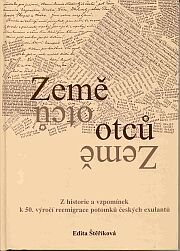
Publication:
- from the history and memories to the 50th anniversary of the reEmigration the descendants of Czech exiles
- The author is in detail concerned to the exile colonies in Střelín Area, Tábor Area, Opole Area, in Poland, Volynia and Ukraine.
- rich documentary appendix, maps, lists of inhabitants, black-and-white photos
About the Author:
prom. hist. Edita Štěříková (* 1937), archivist emeritus of the Protestant Church in Hesse and Nassau, scientific worker who addicts herself long-time to the problems of Czech evangelic exile; published special literature: From the Need of the Redemption (1992), The Process of the Life of Czech Exiles in Berlin in 18th century (1999), Invited to Silesia (2001), Zelów (Czech Exile Community in Poland) (2002), Exiles' Asylum in Lusatia and Saxony (2004), Shortly about Exiles of the post-White-Mountain Period (2005), Exile Preacher (2007)
Bibliographic data:
Štěříková, Edita: Země otců, civic association Exulant, Prague 1995, 505 p. (1st edition)
Štěříková, Edita: Země otců, published by KALICH, Prague 2005, 503 p. (2nd edition)
ISBN 80-7017-018-2 (2nd edition)
Notes:
- available only in Czech
- the 2nd edition to order on-line in Kalich Publishers:
 Nakladatelství a knihkupectví Kalich
Nakladatelství a knihkupectví Kalich
Jungmannova 9, 101 78 Praha 1
☎ +420 224 947 505, fax +420 224 947 504
Edita Štěříková: From the Need of the Redemption (Czech Exile in 18th Century to Prussian Silesia)
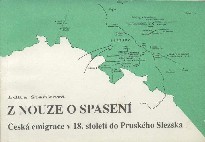
Publication:
- the publication was issued to 250th anniversary of Czech emigration to Prussian Silesia (1742–1992);
- it is the first and prefatory book from the long row of publications focussed on Czech exiles abroad;
- the Czech evangelic exile occupied the area from Berlin across Silesia till Ukraine;
- the titles of the chapters: The Czech Exile in 1730's: to Lusatia and to Berlin; the Organized Emigration in the First War of Silesia; The Meeting-Place of Czech Exiles in Münsterberg; the Division of the Czech Congregation in Münsterberg to the Lutheran One and the Reformed One; the Settlement of Czech Exiles in Silesia; Husinec; Frederick's Camp (Friedrichstabor); Frederick's Castle (Friedrichsgrätz); the Establishment of the other Czech Colonies in Poland (Zelów), the Development of the Silesian Exiles' Settlements; the Mother Tongue and the Nationality; the Remigration;
- the renderings of the historical sources and graphic materials are commented both, Czech and German
About the Author:
prom. hist. Edita Štěříková (* 1937), archivist emeritus of the Protestant Church in Hesse and Nassau, scientific worker who addicts herself long-time to the problems of Czech evangelic exile; published special literature: The Fatherland (1st edition; 1995), The Process of the Life of Czech Exiles in Berlin in 18th century (1999), Invited to Silesia (2001), Zelów (Czech Exile Community in Poland) (2002), Exiles' Asylum in Lusatia and Saxony (2004), The Fatherland (2nd edition; 2005), Shortly about Exiles of the post-White-Mountain Period (2005), Exile Preacher (2007)
Bibliografic data:
Štěříková, Edita: Z nouze o spasení (Česká emigrace v 18. století do Pruského Slezska), published by KALICH, Prague 1992, 182 p.
ISBN 80-7072-948-1
Note:
— available only in Czech
The Rupture in the Curtain (or the Church Contacts of Dutch and Czech Protestants in 1959–1989)
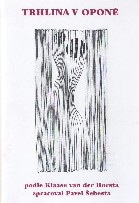
Publication:
- compiled by Pavel Šebesta according to the thesis of Klaas van der Horst: Een scheur in het gordijn (issued by EMAN, Heršpice 1997);
- this small brochure by young Dutch historian from Utrecht is the summary of the mentioned thesis written in Dutch;
- the study ensures a disinterested view of the foreigner on the modern Church history of Czechoslovakia and Czechia and fills this way up to this day a “white place” of the history;
- the author drew most of information for the book from interviews with people from Netherlands and Czechoslovakia, there are too little special literature and historical sources for this question, (it is comprehensible when considering that any contacts across the “Iron Curtain”, which lied through the whole Europe, were very much embarrassed by the totalitarian state authority on the Czechoslovakian side);
- appendixes: translation of the originally summary of the thesis, lists of the Dutch students that studied in Prague and Czech students who studied in Netherlands, names of the foreigner theologians and philosophers that participated the so called “flat seminaries”, and list of congregations from the Evangelic Church of Czech Brethren in partnership with congregations from the Reformed Church of Netherlands
About the Author:
Klaas van der Horst graduated History in Utrecht, he studied in 1996–1997 as a year-long scholarship the Evangelic Theological Faculty of the Charles University in Prague, as well as his father who had studied in Prague in 1960's too and who helps all his lifetime to entering the inter-congregational contacts between the Reformed Church of Netherlands and Evangelic Church of Czech Brethren, publication: Een scheur in het gordijn (1997)
Bibliographic data:
Šebesta, Pavel (ed.): Trhlina v oponě (aneb církevní kontakty nizozemských a českých protestantů v letech 1959–1989), published by EMAN, Benešov 2002, 32 p.
ISBN 80-86211-21-5
Notes:
- available only in Czech
- to order on-line in Kalich Publishers:
 Nakladatelství a knihkupectví Kalich
Nakladatelství a knihkupectví Kalich
Jungmannova 9, 101 78 Praha 1
☎ +420 224 947 505, fax +420 224 947 504
 VERITAS, r.a.
VERITAS, r.a.


